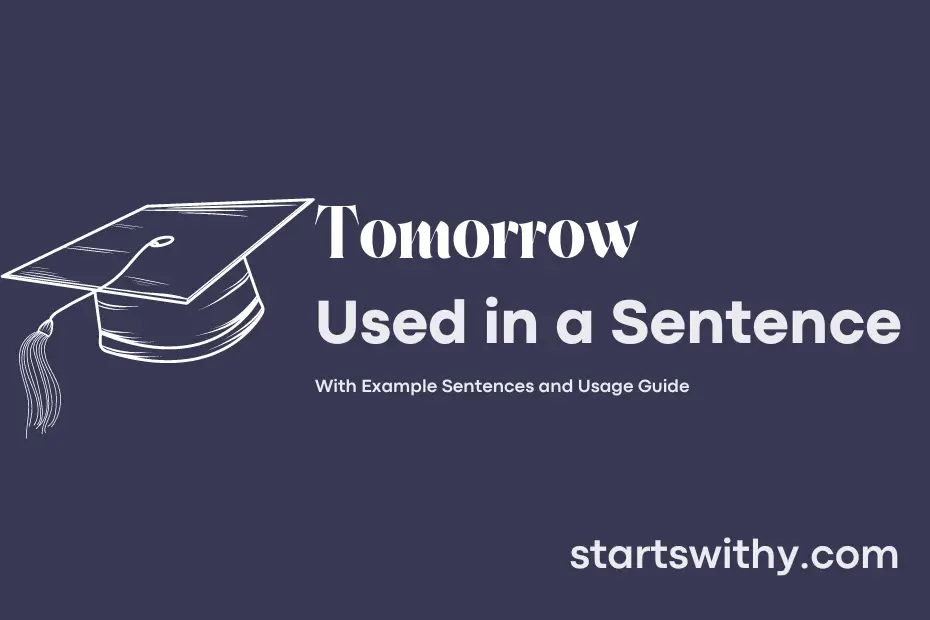Have you ever wondered how to talk about events or plans that will happen in the future? This is where “tomorrow” comes into play.
“Tomorrow” is a commonly used word that refers to the day following the current one. It is used to discuss upcoming events or actions that are scheduled for the day after today.
7 Examples Of Tomorrow Used In a Sentence For Kids
- Tomorrow is a new day.
- What will you do tomorrow?
- We will learn new things tomorrow.
- Let’s play together tomorrow.
- Tomorrow we will have fun in school.
- Remember to bring your book tomorrow.
- We can draw pictures tomorrow.
14 Sentences with Tomorrow Examples
- Tomorrow is the deadline for submitting the research paper.
- I have an important exam tomorrow and I need to study all night.
- I’m planning to attend a workshop on digital marketing tomorrow.
- Tomorrow is the last day to pay the hostel fees.
- I have a meeting with my project group tomorrow to discuss our presentation.
- I need to finalize my internship application by tomorrow.
- Tomorrow is the deadline to submit the application for the scholarship.
- I have a job interview tomorrow and I’m feeling nervous.
- Tomorrow is the deadline to register for the college fest.
- I have a group study session scheduled for tomorrow evening.
- I need to prepare a presentation for the seminar tomorrow.
- I have a campus recruitment drive tomorrow.
- Tomorrow is the last day to return the library books.
- I’m attending a guest lecture by a renowned speaker tomorrow.
How To Use Tomorrow in Sentences?
-
Tomorrow is the word used to refer to the day after today.
-
Tomorrow is often used to talk about plans, appointments, or events that will happen the next day.
-
When writing a sentence with tomorrow, make sure to capitalize the first letter of the word, as it is the beginning of a sentence.
-
For example, you can say, “I will go to the beach tomorrow.” This sentence indicates that the action of going to the beach will occur the day after today.
-
It is important to remember that tomorrow always refers to the day following the current day. So, if today is Monday, tomorrow would be Tuesday.
-
You can also use the word tomorrow to express future intentions or plans. For instance, “I will finish my homework tomorrow.”
-
Additionally, tomorrow can be used to indicate a specific point in time. “The party is scheduled for tomorrow evening.”
-
Remember to use tomorrow in a sentence that makes sense contextually and grammatically, to effectively convey your message about something happening in the near future.
-
Practice using tomorrow in different sentences to improve your understanding of its usage and to communicate effectively when referring to future events or plans.
Conclusion
In conclusion, planning ahead with sentences containing “tomorrow” can help individuals stay organized and prepared for the day ahead. By incorporating tasks, goals, or events into tomorrow’s agenda, one can streamline their thoughts and ensure nothing important is overlooked. These proactive sentences serve as reminders and prompts for future actions, promoting productivity and efficiency.
Embracing the power of phrases involving “tomorrow” cultivates a proactive mindset that encourages anticipation and effective time management. By habitually using such sentences, individuals can enhance their planning skills, minimize procrastination, and ultimately lead a more structured and purposeful daily life.



